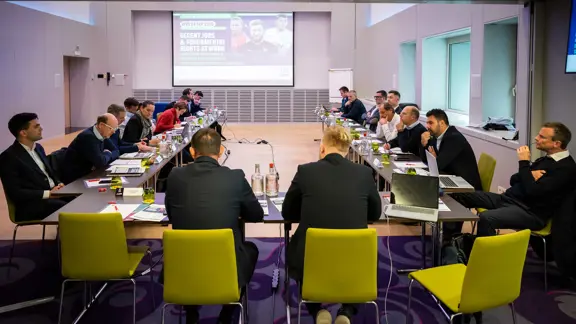News
FIFPRO Europe hosts working lunch on decent jobs and fundamental rights in football

FIFPRO Europe convened player union representatives and industry stakeholders in Brussels for a working lunch focused on employment conditions and decent work standards in professional football. The event was attended by player unions from Cyprus, Belgium, Romania, and Slovakia, alongside representatives from European institutions and football industry experts.
Addressing the reality behind the headlines
Hosted by FIFPRO Europe Vice-President and PASP Executive President Spyros Neofytides, the session examined the stark contrast between football's record-breaking revenues and the precarious working conditions facing the majority of professional players worldwide.
"While football continues to generate unprecedented wealth, thousands of players across all levels face employment instability, payment disputes, and inadequate social protection," said Neofytides in his opening remarks. "This working lunch brings together those on the frontlines of player advocacy to discuss how we collectively address these challenges."
❌ Non-payment
— FIFPRO (@FIFPRO) October 3, 2025
❌ No protections
❌ No employee status
Too many footballers are still trapped in precarious work.
At the recent #FIFPRO Europe x Player IQ Working Lunch, stakeholders came together to push for decent work and fundamental rights. pic.twitter.com/AaBVcaL9jt
Key discussion areas
The working lunch covered four critical dimensions of player employment:
- Employment Conditions and Market Realities: Participants reviewed findings from FIFPRO's 2016 Global Employment Report and 2021 State of the Game Report, examining how employment standards vary dramatically across football's global landscape. From Slovakia's self-employment contract structures to systematic payment delays across multiple leagues, the session highlighted persistent challenges facing players at all levels.
- Employment Disputes and Substandard Conditions: Greek football alone recorded €27.2 million in unpaid player wages across 56 insolvent clubs between 2011 and 2021, which was reflected in the numbers of the FIFPRO x FIFA Fund for Football Players.
- Revenue Growth and Decent Work: Football Benchmark CEO Andrea Sartori presented analysis on football's extraordinary revenue growth and increasing market polarisation. While European football revenues exceed billions annually and major leagues and competitions continue breaking commercial records, this prosperity has not translated into proportional improvements in player working conditions across the football pyramid.
- Regulatory and Policy Responses: Discussions focused on opportunities to improve revenue redistribution mechanisms in upcoming competition cycles, as well as direct initiatives targeting precarious working conditions through enhanced player protection and benefit schemes. Representatives from the European Commission's DG Employment and Sport Unit outlined European initiatives regarding the implementation of the European Pillar of Social Rights, and an upcoming Communication on Sport expected in 2026.
Looking ahead
The working lunch served as a precursor to a standing commitment to monitoring and improving working conditions across professional football.
"We need to more clearly address the precariousness that defines large parts of our sector and its workers," said Alexander Bielefeld, FIFPRO Director for Global Policy and Strategic Relations (Men's Football). "Broader employment security and social protection issues are unfortunately a reality that too many players know all too well. The evidence is clear – football has the resources to ensure decent work standards. Now we need the collective will to make it happen."
